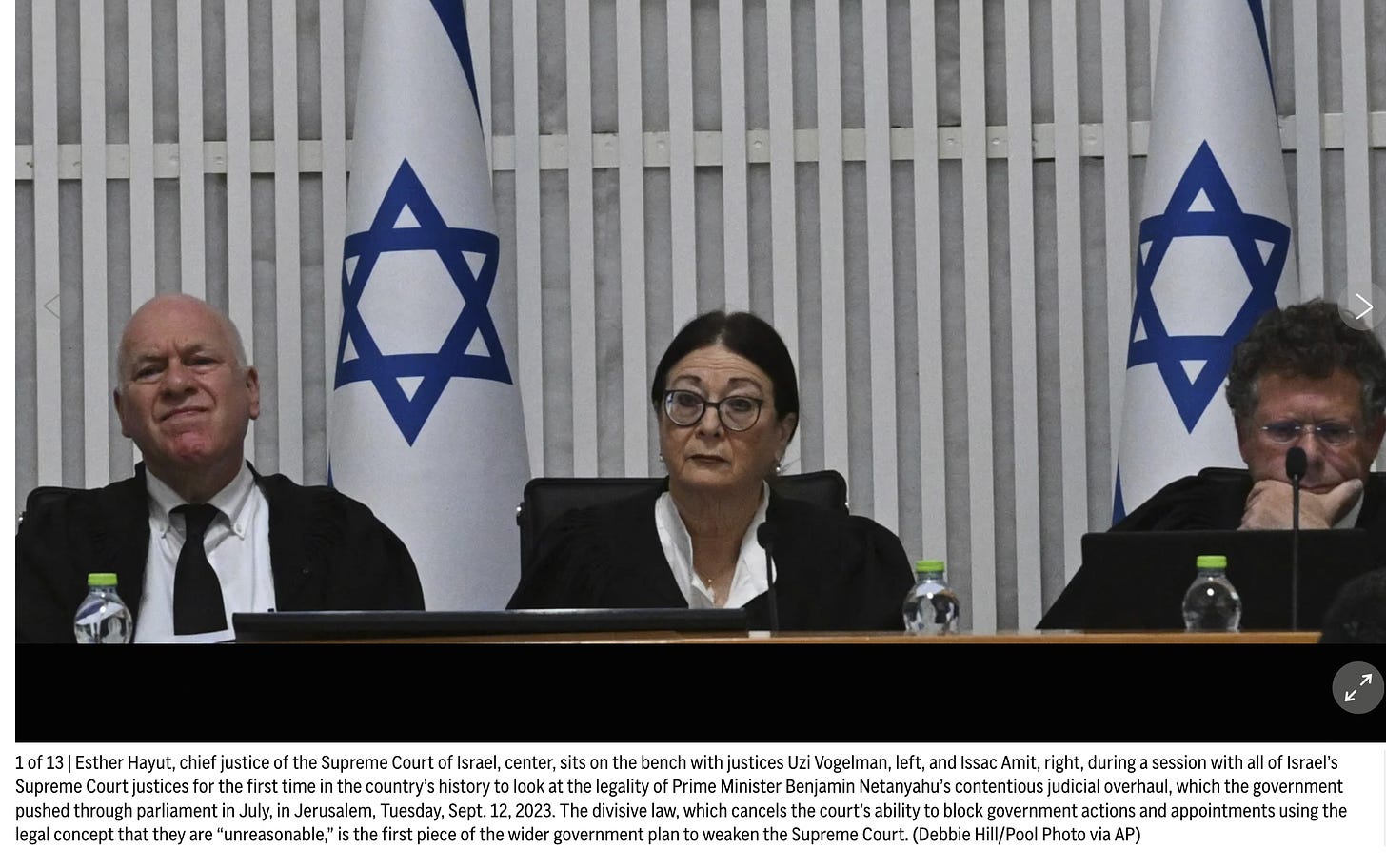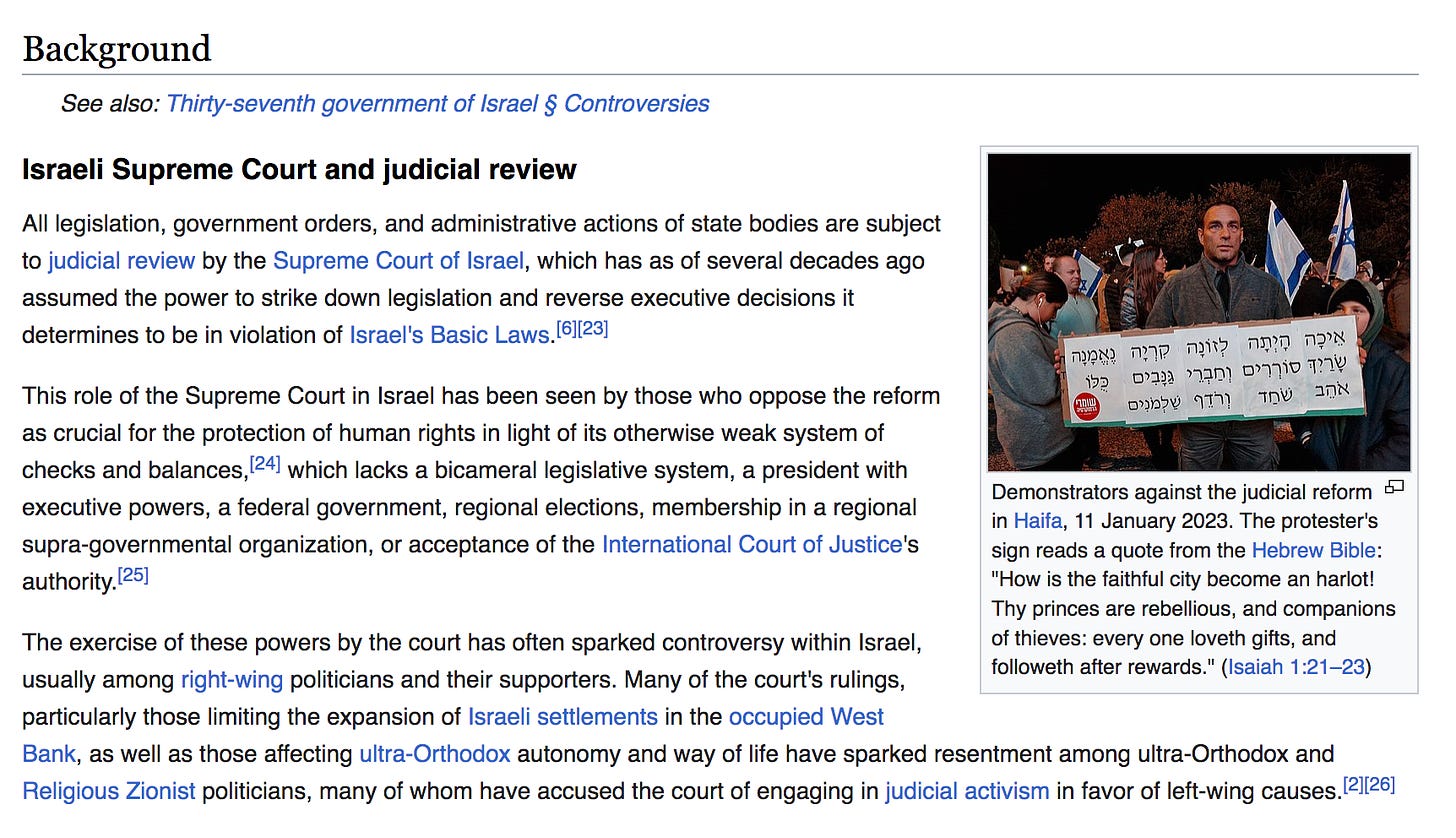Netanyahu's Attempt to Weaken Israeli Supreme Court FAILS
Israel Supreme Court Strikes Down Netanyahu's attempt to change the Judicial Powers
“The ruling marks the culmination of a year-long battle between the government and the judiciary over the nature of Israel’s democracy, and the question of which branch of government has ultimate say over its constitutional character.” — Times of Israel
Israeli Prime Minister Benjamin Netanyahu was just handed a big fat fail. His coalition government passed legislation last year that would gut the powers of the Supreme Court to strike down laws that didn’t pass the “reasonability” test.
Click to watch for my analysis (with a touch of snark):
You see, unlike the United States, which is a Constitutional Republic, Israel does not have a constitution to restrict which laws can be made. Instead, there is a compilation of what is called “Basic Laws” that are passed by the legislative body, which is called the Knesset.
Israel has a type of Parlimentary system of government, whereby the legislature, led by the Prime Minister, proposes and passes laws.
So where are the “checks and balances” like we have in our three branches of government (executive = president; legislative = congress; judicial = courts)?
Well, that is left to the judicial branch in Israel.
And Netanyahu’s government wants to squash those powers so that the Prime Minister and Knesset would be more powerful.
Gee, sounds like nothing could go wrong with this push, right?
Riiight.
When these laws were passed intending to reduce the Supreme Court’s power, hundreds of thousand of Israelis took to the streets in massive, historic protests.
Netanyahu’s popularity, already at a low, fell even lower.
Keep in mind that Netanyahu was also facing a series of criminal trials for charges of massive fraud and corruption. See my video here for details.
Hmmm… and then came October 7, when the Israeli Defense Forces failed massively in protecting the Israeli population that (the media showed us) was under attack from the exceedingly inferior Hamas forces out of Gaza.
Not to diminish any of the horrors that have been reported on both sides of this heinous debacle, it still must be said that the attacks provided a very convenient and timely distraction away from Netanyahu’s scandals.
I’ve got an entire Israel playlist covering all this and more.
Fast forward to the current day where the Israeli Supreme Court announced its striking down of a key component of Netanyahu’s “polarizing judicial overhaul.”
That’s the overview, and if you’d like a deeper dive, let’s dig in here:
From the Associated Press: “Israel’s Supreme Court overturns a key component of Netanyahu’s polarizing judicial overhaul.”
Here’s the summary according to the AP:
“Israel’s Supreme Court struck down a key component of Prime Minister Benjamin Netanyahu’s contentious judicial overhaul Monday, delivering a landmark decision that could reopen the fissures in Israeli society that preceded the country’s ongoing war against Hamas.
The planned overhaul sparked months of mass protests, threatened to trigger a constitutional crisis between the judicial and legislative branches of government, and rattled the cohesion of Israel’s powerful military.
In Monday’s decision, the court narrowly voted to overturn a law passed in July that prevents judges from striking down government decisions they deem “unreasonable.” Opponents had argued that Netanyahu’s efforts to remove the standard of reasonability opens the door to corruption and improper appointments of unqualified cronies to important positions.
In an 8-7 decision, the Supreme Court justices struck down the law because of the “severe and unprecedented harm to the core character of the State of Israel as a democratic country.”
The justices also ruled 12-3 that they had the authority to overturn so-called “Basic Laws,” major pieces of legislation that serve as a sort of constitution for Israel.
Netanyahu’s government could decide to ignore Monday’s ruling, setting the stage for a constitutional showdown over which branch of government has ultimate authority.
The law has to do with the ability of the court to review government decisions based on a “reasonableness standard.” Not just laws, but decisions.
Here are the details of the actual law in dispute: Israel: Legislation Abolishes Reasonableness as a Standard for Judicial Review of Government's Decisions
“Notwithstanding the provisions of this basic law, those who have jurisdiction by law, including the Supreme Court sitting as the High Court of Justice, will not consider the reasonableness of a decision of the government, the prime minister, or any other minister, and shall not issue an order in this regard. In this section, ‘decision’ means any decision, including regarding appointments or a decision to refrain from exercising any authority.”
The background narrative that the AP and other media outlets were reporting is that Netanyahu's judiciary reform plan aimed to curb the power of judges, including limiting the Supreme Court's authority to review parliamentary decisions and changing the way judges are appointed. Supporters argue that the changes intend to strengthen democracy by reducing the authority of unelected judges and giving more power to elected officials. Opponents of the legislation, including Israel's attorney general, argue that "reasonableness" serves as a crucial standard in the Israeli legal system and represents one of the few mechanisms allowing the judiciary to scrutinize potential overreach by the country's heavily centralized executive branch. They contend that eliminating this standard would eliminate the primary tool for assessing arbitrary and excessively unreasonable government decisions, particularly significant in countries lacking a written constitution, such as Israel.
Note: Under the Israeli system, the prime minister governs through a majority coalition, effectively controlling the executive and legislative branches. The Supreme Court plays a critical oversight role.
Before the Israel-Hamas incident, hundreds of thousands of Israelis, including military reservists, protested weekly against the government. Reservists, a significant part of the Israeli military, stated that they would refuse to report for duty if the proposed “judicial reform” was passed.
And yes, it’s clear that prior to the Israel-Hamas incident on October 7th, there was massive political unrest in Israel.
Here are a few key facts:
Israel does not have a single, comprehensive written constitution. Instead, it relies on a series of Basic Laws that serve as the constitutional foundation. The Basic Laws address fundamental principles of the state, government structure, and individual rights. The authority of the Supreme Court is grounded in these Basic Laws, which grant the court the power of judicial review.
Israel's judicial system comprises Magistrate Courts, District Courts (the intermediate level dealing with more serious criminal and civil matters, including appeals), and The Supreme Court, located in Jerusalem and consisting of 15 justices. The Supreme Court serves as the highest court with appellate jurisdiction over both civil and criminal cases. It also functions as the High Court of Justice, allowing individuals to petition against government decisions. All judges are appointed.
Israel's Political System: A Parliamentary Democracy
The key elements include a unicameral legislative body known as the Knesset, where diverse political parties vie for representation. The ceremonial head of state is the President, currently Issac Herzog. (He is the son of Major-General Chaim Herzog, who was the Israel’s representative to the United Nations for three years.)
In October 2021, Herzog participated in a memorial for the victims of the 1956 Kafr Qasim Massacre and apologized on behalf of the State of Israel, making him the first Israeli official to ask for forgiveness at the official ceremony in Kafr Qasim. In his speech, Herzog said: “The killing and injury of innocents are absolutely forbidden. They must remain beyond all political arguments.”[33]
However, Herzog now says there are no innocent Palestinians:
Israel’s president Isaac Herzog claimed in a press conference that there are no innocent civilians in Gaza, while thousands of Palestinians struggled to flee northern Gaza after Israel’s military told some 1.1 million of them to evacuate south ahead of an anticipated military operation.
“It is an entire nation out there that is responsible,” Herzog said at a press conference on Friday, October 13, the HuffPost reported on.
“It is not true this rhetoric about civilians not being aware, not involved. It’s absolutely not true. They could have risen up. They could have fought against that evil regime which took over Gaza in a coup d’etat.”
International law is clear that belligerents who fail to distinguish between combatants and civilians are guilty of war crimes. [emphasis added]

The Prime Minister is the leader of the majority party or coalition in the Knesset (unicameral legislature of Israel) and holds the reins as the head of government. Israel's electoral system employs proportional representation, allowing parties to secure seats based on the percentage of votes they garner in national elections. A major difference between this form of government and the US Constitutional Republic is that in Israel, the executive authority is derived from the legislative branch. Regular elections are held every four years, or earlier if the government collapses.
In a parliamentary democracy, the head of state and head of government are often separate entities; the head of government, typically the Prime Minister, is accountable to the parliament and can be dismissed through a vote of no confidence.
March 2023: Netanyahu government survives no-confidence votes in Israeli parliament
2023 Israeli judicial reform
The proposed 2023 Israeli judicial reform seeks to modify the country's judicial system and the distribution of powers. The proposed changes include restrictions on the Supreme Court's authority to conduct judicial review, increased government oversight in judicial appointments, and a curtailment of the authority held by legal advisors.
July 2023: “Israel’s parliament on Monday approved the first major law in Prime Minister Benjamin Netanyahu’s contentious plan to overhaul the country’s justice system, triggering a new burst of mass protests and drawing accusations that he was pushing the country toward authoritarian rule. In Monday’s vote, lawmakers approved a measure that prevents judges from striking down government decisions on the basis they are “unreasonable.”
The government’s critics say removing the standard of reasonability opens the door to corruption and improper appointments of unqualified cronies to important positions. The Supreme Court, for instance, this year struck down Netanyahu’s appointment of a key ally for interior and finance minister as unreasonable because of past convictions for bribery and tax cheating.” —AP
Who is behind the plans to reform the judiciary?
Prime Minister Netanyahu is leading the Israeli judicial reform project, alongside key officials like Justice Minister Yariv Levin from the Likud Party and Simcha Rotman, chair of the Knesset’s Constitution, Law, and Justice Committee, affiliated with the Religious Zionist Party.
According to the Council on Foreign Relations, these efforts have been aided by the Kohelet Policy Forum—an organization backed financially by American and Israeli citizens, dedicated to “securing Israel's future as the nation-state of the Jewish people, strengthening democracy, and promoting individual liberty and free-market principles.” And there are several interesting connections here…
What’s the endgame? What do they aim to achieve?
This recent Supreme Court ruling, a rebuke to a law hindering judges from scrutinizing government decisions for "reasonableness," comes on the heels of mass protests, political unrest, and a fervent debate over the delicate balance of power and it has the potential to escalate into a constitutional crisis.
Israel might want to think about going the Constitutional Republic route—imagine a clear separation of powers with coequal branches, an emphasis on safeguarding individual liberty, and a rule of law that's as dependable as your morning coffee. Sprinkle a few limited government safeguards and boom, you’ve got the best system there is. Why? Because all the other forms of government like a democracy or monarchy have a propensity to revert to their "bad forms" where tyranny can take root.
The Constitution, you and I both know, has been stomped on and corrupted over the years, but the ideals and values it stands for, I believe, are worth fighting for.
The United States is the only country in the world that was created with a constitutional republican form of government. Our founders disapproved of "pure" or "unrestricted" democracy. Democracy, in its purest form, contains the tendency toward mob control and the suppression of civil liberties.
A constitutional republic is a brilliant way of diffusing power. Of course, there are democratic elements, but America was not created to be, nor is it, a democracy.
As always, I LOVE reading your comments. Please add yours as well!
Read Next:










Thanks Peggy! Ive never liked Netanyahu! Hes a liar and a cheat. His recent forcing covid vax on every Israeli with astronomical deaths and illness was rejected by the Ultra Right. Also He never wanted the “Two State Solution” and the moment he got in power he attacked the PLO hierarchy with military attacks to upset the agreement reached by his predecessors. The counter attacks of course gave him the pretext of more attacks. Im not saying the Palestinians have not contributed but Israel has always had the upper hand. According to Journalist Seymour Hersh, “Bibi” and his hardcore Right friends secretly funded Hamas to create chaos in the leadership in Palestine with money laundered thru Qatar. These toxic Jewish “settlements” on Arab land have also been a constant source of provocation when Arab properties are “confiscated” or bulldozed. The “Palestinian problem”, ie how to get rid of them, was acknowledged when Israel was first formed by Ben Gurion and Meier. Now a thousand Israelis suffered for “the greater good” so he could finally get rid of “the problem”. Epstein and Maxwell were/are Mossad to lure Western and other World leaders into compromising positions for blackmail.. bullying is their forte’ …these are not nice people but are government isnt either for that matter